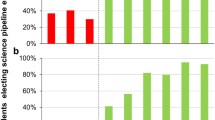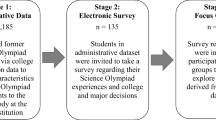Abstract
India’s National Science Talent Search (NSTS) examination (1963 to 1976) was imagined and implemented by some top scientists of the period. It aimed to identify “talented” secondary school students with an aptitude for science and mathematics. Selected students attended undergraduate summer schools, did research in special labs during their Master’s degree, and were supported by a scholarship until the completion of a Ph.D. Today, the extent to which NSTS changed the discourse of “talent” as well as the mode and content of large-scale testing in India is often forgotten. Among the innovations that the examination introduced and legitimized include the multiple-choice question (MCQ) format. It shaped a positivist discourse around a special category of questions called the “thought-type” in scientifically establishing the mental acuity of students. It also defined and used “extra-curricular knowledge” as a proxy for scientific interest. Another legacy of NSTS’s discourse of objectivity was a misplaced confidence in separating the performance of candidates from the social advantages/disadvantages that shaped their school experience. Additionally, the importance of expertise in designing the examination did not give space to the input of school science teachers. Eventually, the design of the scheme fell short of the expectations of policy-makers as well as the aspirations of those who were selected. In 1977, the examination was redesigned as a general National Talent Search Examination (NTSE). A critical analysis of the short history of the NSTS enables us to reflect on the construct of “science talent” and the challenges in identifying and nurturing talented students in science.
Similar content being viewed by others
Data Availability
The author declares that the data which has been analyzed in this manuscript are available in the public domain.
Code Availability
Not applicable.
Notes
The program was to later become the Intel Science Talent Search in 1998 and subsequently the Regeneron Science Talent Search from 2016 onwards.
In classical Sanskrit philosophy, pratibhā is a supersensuous apperception that is distinct from intellect and is deemed to be the source of the excellence and creativity displayed in outstanding poetic and artistic creation. (Shulman, 2008).
This is a legacy of the prestige associated with the colonial Indian Civil Service which also introduced the modern examination format to select Indian candidates (Kumar, 1991).
The Jagdish Bose National Talent Search Examination precedes the NTSE in that it started in 1956. However, the test could be taken only by “any boy or girl reading in a college affiliated to any of the universities in West Bengal.” Therefore, its reach was not national in the way that the NTSE was.
Adjusting for inflation, this represents a value that is Rs. 6591 (in July 2020) or nearly 88 Dollars, a month.
A union territory is a region directly administered by the Central government of India, rather than a state.
These are castes and tribes who are recognized in the First Schedule of the Indian constitution. Because of the historical socio-economic injustices and disadvantages that they have experienced, members of these groups are entitled to positive discrimination in such as specific reservation in education, employment etc.
This statuatory body under the Ministry of Education is responsible for the determination of standards and the distribution of funding for higher education institutions.
References
Agarwal, M., & Jain, V. K. (2005). Discussion paper. Seminar Cum Workshop for the Review of National Talent Search Scheme (pp. 18–50). Department of Education Measurement and Evalutation
Anderson, R. (2010). Nucleus and nation: scientists, international networks and power in India. University of Chicago Press
Borland, J. (1997). The construction of giftedness. Peabody Journal of Education, 72(3 & 4), 6–20
Carson, J. (2007). The measure of merit. Princeton: Princeton University Press.
Cousins, M., & Hussain, A. (1984). The question of ideology: Althusser, Pecheux and Foucault. The Sociological Review, 32(1_suppl), 158–179. https://doi.org/10.1111/j.1467-954x.1984.tb00111.
Foucault, M. (1972). The archaeology of knowledge and the discourse of language. Pantheon books
Government of India (GOI). (1958). Science policy resolution. New Delhi: Department of Science and Technology, Ministry of Science and Technology.
Government of India (GOI). (2001). Selected Education Statistics, 2000–2001. New Delhi: Ministry of Human Resource Development.
Grigorenko, E., & Clinkenbeard, P. (1994). An inside view of gifted education in Russia. Roeper Review, 16(3), 167–171. https://doi.org/10.1080/02783199409553566.
Hacking, I. (1999). The social construction of what? Harvard University Press
Hall, S. (1992). West and the rest: discourse and power. In S. Hall & B. Gieben (Eds.), Formations of modernity (pp. 275–331). Polity Press and the Open University
Jain, V. K. (2002). An appraisal of the NTSE-2001. New Delhi: NCERT.
Kapur, A. (1994). India: the nuclear scientists and the state, the Nehru and post Nehru years. In E. Solingen, Scientists and the state: domestic structures and the international context (pp. 209–230). University of Michigan Press
Kumar, D. (2000). Reconstructing India: disunity in the science and technology for development, 1900- 1947. Osiris, Vol. 15, Nature and Empire: Science and the Colonial Enterprise
Kumar, K. (1986). Agricultural modernization and education: contours of a point of departure. Economic and Political Weekly, 31(35/37), 2367-2369-2371–2373
Kumar, K. (1989). NCERT’s silver jubilee. Economic and Political Weekly, 21(38–39), 1682
Kumar, K. (1991). The political agenda of education. Sage Publications
Milgram, R. (2000). Identifying and enhancing talent in Israel. Roeper Review, 22(2), 108–110
Naik, J. P. (1979). Equality, quality and quantity: the elusive triangle in Indian education. International Review of Education, 25(2–3), 167–186
Naik, J. P. (1982). The education commission and after. APH Publishers
NCERT. (1964). Proceedings of the Third Meeting of the NCERT. NCERT
NCERT. (1967). Annual report 1966–1967. NCERT
NCERT. (1980). Annual report 1979–1980. NCERT
NCERT. (1984). Annual report 1983–1984. NCERT.
NCERT. (2006). Annual report of the NCERT 2005–2006. Delhi: NCERT.
Oommen, T. K. (1989). India: brain drain or the migration of talent. International Migration, 27(3), 411–425.
Raina, M. K. (1984). Background of the talented. NCERT
Raina, M. K. (1989). An intensive study of the accomplishments of national science talent scholars. NCERT
Raina, M. K. (1991). The talented scholars: accomplishments and worldview of the talented. Delhi: NCERT.
Sandelowski, M. (2000). Whatever happened to qualitative description? Research in Nursing and Health, 23, 334–340
Saxena, K. N. (1963). Science Talent Search Pilot Project (Delhi Territory)- a factual report. NCERT
Saxena, K. (1964). A report of the Science Talent Search Examination. NCERT
Saxena, K. N. (1965). A report of the Science Talent Search Examination 1965. NCERT
Saxena, K. N. (1966). A report of the Science Talent Search Examination 1965. NCERT
Saxena, K. N. (1967). A report of the Science Talent Search Examination. NCERT
Shulman, D. (2008). Illumination, imagination, creativity: Rājaśekhara, Kuntaka, and Jagannātha on Pratibhā. Journal Of Indian Philosophy, 36(4), 481–505
Snow, R. E. (2012). The concept of aptitude. In R. Snow & D. Wiley (Eds.), Improving inquiry in the social sciences: a volume in Honor of Lee J Cronbach (pp. 249–284). Routledge.
Stebbins, R. (2001). Exploratory research in the social sciences. Sage
Thapar, R. (2009). The history debate and school textbooks in India: a personal memoir. History Workshop Journal, 67(1), 87–98.
Wiener, P. P. (1961). Some problems and methods in the history of ideas. Journal of the History of Ideas, 22(4), 531–548
Zachariah, B. (2001). Uses of scientific argument: the case of ‘development’ in India c.1930–1950. Economic and Political Weekly, 36(39), 3689–3702
Zhilin, D. (2010). Work with gifted children in Russia. Retrieved August 2, 2010, from http://www.giftedchildren.org.nz/national/article9.php
Author information
Authors and Affiliations
Corresponding author
Ethics declarations
Ethics Approval
Not applicable.
Consent to Participate
Not applicable.
Consent for Publication
Not applicable.
Conflict of Interest
The author declares no conflict of interest.
Additional information
Publisher's Note
Springer Nature remains neutral with regard to jurisdictional claims in published maps and institutional affiliations.
Rights and permissions
About this article
Cite this article
Philip, R. India’s National Science Talent Search Examination (1963–1976). Sci & Educ 31, 241–263 (2022). https://doi.org/10.1007/s11191-021-00210-5
Accepted:
Published:
Issue Date:
DOI: https://doi.org/10.1007/s11191-021-00210-5




